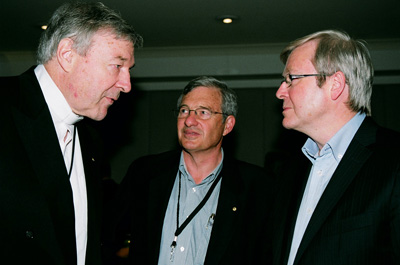
DAVID ADAMS reports…
A petition signed by more than 21,000 people opposed to the proposed national human rights act is being tabled in the Senate today.
The petition, one of the biggest tabled in the current parliament, was created by the Australian Christian Lobby who have been vocal in their stance against the proposed act.

CONFERENCE TALK: Cardinal George Pell, Australian Christian Lobby managing director Jim Wallace and Prime Minister Kevin Rudd at the ACL’s national conference in Canberra last weekend.
Tabled by Shadow Attorney-General George Brandis, it calls on Parliament to reject the proposal for the human rights act or not enact such legislation until a referendum is held on the issue.
ACL managing director Jim Wallace says while Christians “care deeply” about protecting the human rights of the most vulnerable, “they are aware that the proposed charter of rights would do little to benefit human rights, but much to undermine some basic freedoms Christians take for granted”.
Last month the National Human Rights Consultation Committee handed down a report in which it recommend that Australia adopt a national Human Rights Act which would cover everything from the right to freedom from forced work to the right of freedom of association.
It also proposed giving High Court judges the power to make a “declaration of incompatibility” with any proposed act, expanding the functions of the Australian Human Rights Commission and establishing a joint parliamentary committee on human rights.
The ACL, among others, has argued that the introduction of such an act would involve a shift of policy-making power from parliament to unelected judges.
Mr Wallace says that human rights acts “inevitably reflect someone’s ideology, usually not reflective of the well-being of the most vulnerable” and notes that both the ACT and Victorian charter of rights exclude the right to life of a child at birth “despite the fact that the right to life is the most inalienable of rights”.
Speaking at the Australian’s Christian Lobby’s national conference in Canberra last weekend, Cardinal George Pell, Catholic Archbishop of Sydney, expressed concern about the introduction of such statutes, asking why it is that such statutes, such as Victoria’s existing Charter of Rights and Responsibilities, “seem to end up violating and diminishing some human rights rather than protecting them?”.
Elsewhere in his speech, Cardinal Pell attacked the Human Rights Commission’s inquiry into the freedom of religion in Australia, saying the “only question about its outcome is how bad it would be”.
He said that rights such as the rights to life, marriage and family,the recognition of the family based on marriage as the fundamental unit of society, the rights of parents to determine the moral and religious education of their children, and the rights to freedom of religion, belief and conscience were all recognised by the major international human rights agreements but questioned where the Human Rights Commission was “genuinely committed to human rights as agreed between the nations in the major treaties, or is it actually committed to overthrowing some of them for radically different ideas?”
Not all churches support calls opposing the introduction of a Human Rights Act. Alistair Macrae, president of the National Assembly of the Uniting Church in Australia, recently wrote that the Human Rights Act was an “important legislative tool in ensuring equality for all Australians”.
“Australia has a generally good record on human rights compared with other countries but too many people still fall through the cracks, he wrote. “A Human Rights Act is a safety net which will help those who have fallen through the significant holes in our current array of laws and government practice.”
Addressing concerns that recent events in Victoria were evidence human rights legislation erodes the right to freedom of thought, conscience and religion, he said the Uniting Church saw the Victorian experience as a “lesson in the value of a well-drafted Human Rights Act”.
Rev Macrae said the church was confident that recent legislation surrounding the decriminalisation of abortion in Victoria would have prevented on being passed by the Victorian Charter of Human Rights and Responsibility had the charter not specifically exempted all matters relating to abortion – an exemption which he says was “championed” by some religious groups when the act was drafted.
• The Rudd Government announced earlier this week that it would extend funding for the National School Chaplaincy Program until the end of the 2011 school year.
In a keynote address at the Australian Christian Lobby’s annual conference in Canberra last weekend, Prime Minister Kevin Rudd said the decision would involved an additional investment of $42 million over the next two years.
He said the government would also be consulting widely over the future shape of chaplaincy and pastoral care programs post 2011.
“While there is no denying the success of the National School Chaplaincy Program, it could be improved to better accommodate schools in rural and regional areas, small schools and schools in disadvantaged communities,” Mr Rudd said.
The ACL – whose theme for this year’s conference was ‘Putting Kids First’ – have welcomed the move.





